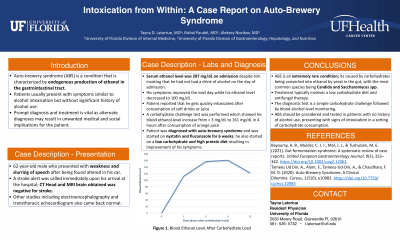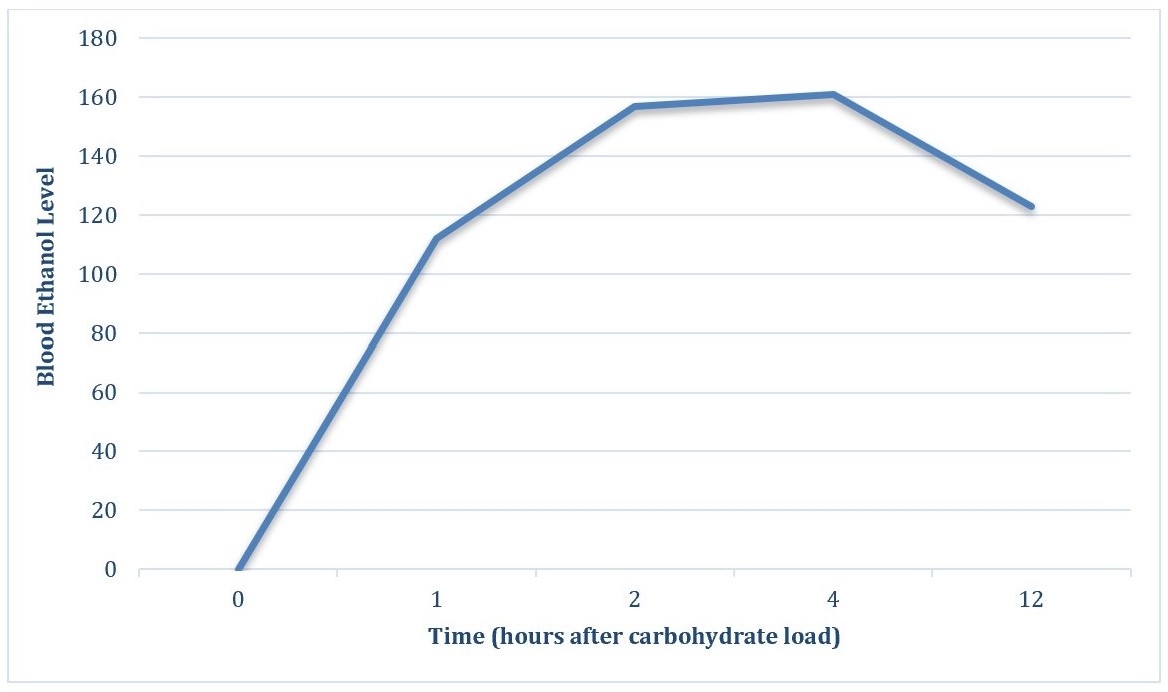Sunday Poster Session
Category: Small Intestine
P1592 - Intoxication From Within: A Case Report on Auto-Brewery Syndrome
Sunday, October 27, 2024
3:30 PM - 7:00 PM ET
Location: Exhibit Hall E

Has Audio
- TL
Tayna Latortue, MD
University of Florida College of Medicine
Gainesville, FL
Presenting Author(s)
Tayna Latortue, MD1, Bishal Paudel, MD2, Aleksey Novikov, MD1
1University of Florida College of Medicine, Gainesville, FL; 2University of Florida, Gainesville, FL
Introduction: Auto-brewery syndrome (ABS) is a condition that is characterized by endogenous production of ethanol in the gastrointestinal tract. The patients usually present with symptoms similar to alcohol intoxication but without significant history of alcohol use. Prompt diagnosis and treatment is vital as alternate diagnoses may result in unwanted medical and social implications for the patient.
Case Description/Methods: This is a 62-year-old male who presented with weakness and slurring of speech after being found altered in his car. A stroke alert was called immediately upon his arrival at the hospital. CT Head and MRI brain obtained was negative for stroke. Other studies including electroencephalography and transthoracic echocardiogram also came back normal. His serum ethanol level was 287 mg/dL on admission despite him insisting that he had not had a drink of alcohol on the day of admission. His symptoms improved the next day while his ethanol level decreased to 100 mg/dL. The patient reported that he gets quickly intoxicated after consumption of soft drinks or juice and feels ill after a high carbohydrate meal. An observed carbohydrate challenge test was performed which showed his blood ethanol level increase from < 3 mg/dL to 161 mg/dL in 4 hours after observed consumption of a can of orange juice. Patient was diagnosed with auto-brewery syndrome and was started on empiric course of nystatin and fluconazole for 6 weeks. He also started following a low carbohydrate and high protein diet resulting in improvement of his symptoms.
Discussion: ABS is an extremely rare condition with only a few cases reported in literature. It is caused by carbohydrates being converted into ethanol by yeast in the gut, with the most common species being being Candida and Saccharomyces spp. Treatment typically involves a low carbohydrate diet and the use of antifungal therapy. The diagnostic test is a simple carbohydrate challenge followed by blood alcohol level monitoring. Given its rarity, it can be difficult for physicians to even consider it to be on the differential for their patients, leading to improper treatment and underdiagnosis of the condition. ABS should be considered and tested for in patients with no history of alcohol use, presenting with signs of intoxication in a setting of carbohydrate consumption.

Disclosures:
Tayna Latortue, MD1, Bishal Paudel, MD2, Aleksey Novikov, MD1. P1592 - Intoxication From Within: A Case Report on Auto-Brewery Syndrome, ACG 2024 Annual Scientific Meeting Abstracts. Philadelphia, PA: American College of Gastroenterology.
1University of Florida College of Medicine, Gainesville, FL; 2University of Florida, Gainesville, FL
Introduction: Auto-brewery syndrome (ABS) is a condition that is characterized by endogenous production of ethanol in the gastrointestinal tract. The patients usually present with symptoms similar to alcohol intoxication but without significant history of alcohol use. Prompt diagnosis and treatment is vital as alternate diagnoses may result in unwanted medical and social implications for the patient.
Case Description/Methods: This is a 62-year-old male who presented with weakness and slurring of speech after being found altered in his car. A stroke alert was called immediately upon his arrival at the hospital. CT Head and MRI brain obtained was negative for stroke. Other studies including electroencephalography and transthoracic echocardiogram also came back normal. His serum ethanol level was 287 mg/dL on admission despite him insisting that he had not had a drink of alcohol on the day of admission. His symptoms improved the next day while his ethanol level decreased to 100 mg/dL. The patient reported that he gets quickly intoxicated after consumption of soft drinks or juice and feels ill after a high carbohydrate meal. An observed carbohydrate challenge test was performed which showed his blood ethanol level increase from < 3 mg/dL to 161 mg/dL in 4 hours after observed consumption of a can of orange juice. Patient was diagnosed with auto-brewery syndrome and was started on empiric course of nystatin and fluconazole for 6 weeks. He also started following a low carbohydrate and high protein diet resulting in improvement of his symptoms.
Discussion: ABS is an extremely rare condition with only a few cases reported in literature. It is caused by carbohydrates being converted into ethanol by yeast in the gut, with the most common species being being Candida and Saccharomyces spp. Treatment typically involves a low carbohydrate diet and the use of antifungal therapy. The diagnostic test is a simple carbohydrate challenge followed by blood alcohol level monitoring. Given its rarity, it can be difficult for physicians to even consider it to be on the differential for their patients, leading to improper treatment and underdiagnosis of the condition. ABS should be considered and tested for in patients with no history of alcohol use, presenting with signs of intoxication in a setting of carbohydrate consumption.

Figure: Figure 1: Blood ethanol level after carbohydrate load
Disclosures:
Tayna Latortue indicated no relevant financial relationships.
Bishal Paudel indicated no relevant financial relationships.
Aleksey Novikov indicated no relevant financial relationships.
Tayna Latortue, MD1, Bishal Paudel, MD2, Aleksey Novikov, MD1. P1592 - Intoxication From Within: A Case Report on Auto-Brewery Syndrome, ACG 2024 Annual Scientific Meeting Abstracts. Philadelphia, PA: American College of Gastroenterology.
